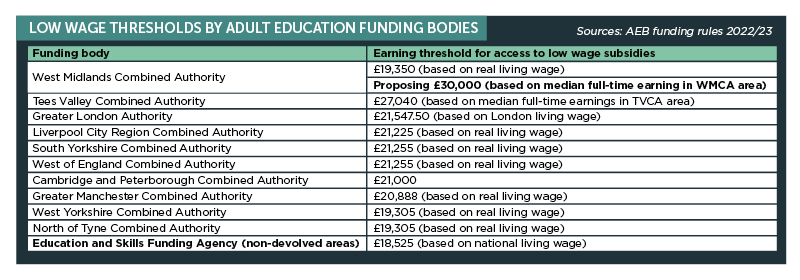Workers in the West Midlands earning up to £30,000 a year will be in line for free adult education under plans to boost access to level 3 training.
Officials at the West Midlands Combined Authority (WMCA) released a set of proposals in a public consultation last Friday which they hope will help boost employment and earnings.
The combined authority, covering Birmingham, Coventry, Dudley, Sandwell, Solihull, Walsall and Wolverhampton, said their region has fewer residents qualified to level 3 than other parts of the country.
One proposal, to increase eligibility for subsidies currently only available to low earners to middle earners on £30,000, would be the most generous in the country.
WMCA also plans to require its grant-funded providers to ensure at least 20 per cent of their AEB provision is at level 3 and has pledged to review learner support funding in response to “additional cost-related barriers” facing local adults.
Subsidies for middle earners
Across AEB funding bodies, low wage learners typically have access to fully funded courses at levels 2 and 3, and access to courses under the free courses for jobs scheme and other local priority level 3 courses.
The full funding of low earning learners who would otherwise be eligible for co-funding was introduced to the Education and Skills Funding Agency’s AEB funding rules in 2018/19.
The agency defines “low wage” learners in this year’s funding rules as earning less than £18,525, based on the national living wage.
Devolved authorities have all adopted the low wage policy but have been more generous than the ESFA in how they define “low wage” (see table).
Most now use the real living wage (£10.90 per hour) as the basis for their definition, which is higher than the national living wage (£9.50 per hour).
The West Midlands is now proposing to increase their threshold to £30,000, which would be the highest in the country, in a two-year trial beginning in August 2023, subject to the consultation.
They are following in the footsteps of Tees Valley Combined Authority, which this year raised its low wage threshold to £27,040 using local median earnings, rather than the living wage.
“We are proposing to set our low wage threshold at £30,000, just below the median pay for full-time jobs across the WMCA area (£30,634). We believe this would reflect a bold commitment to tackling low pay and supporting in-work progression across the region,” WMCA’s consultation document said.
The consultation states that the WMCA is aware that upping the threshold creates a “risk of deadweight”, targeting specific groups of learners or sectors would “make messaging more complex and would likely reduce overall impact.”
Proposals will be funded from existing AEB and free courses for jobs programme budgets, WMCA confirmed.

New minimum volumes
Just over £100 million of WMCA’s £131 million adult education budget is allocated out to 27 providers through grant funding, 21 of which are colleges, with the rest split between WEA and local authorities.
As part of a push to go “further and faster”, the WMCA wants the grant providers it funds to ensure that at least 20 per cent of their AEB provision is at level 3.
This could prove trickier for some providers, particularly local authorities that offer very little provision at level 3 and instead specialise in non-accredited and lower level courses.
Fiona Adridge, head of insight and intelligence at the WMCA told FE Week: “We believe it is possible for grant providers to both excel in providing pathways up to level 2 as well as to expand delivery at level 3. As part of the consultation, we will be engaging with our local authorities to explore how we can best work together to achieve this.”
Qualifications for FE Workforce
The consultation also proposes to fully fund qualifications for FE staff to support providers to “‘grow their own’ and develop talent in the region”.
It is proposed that the WMCA will fund qualifications for teaching assistants at level 3, advice and guidance professionals at level 4, ESOL teachers at level 5 and aspiring leaders, also at level 5, to help providers with recruitment and retention challenges.
“We recognise that while colleges and training providers have access to support for their own staff development, this is limited and does not usually extend beyond level 3,” the consultation states.
Interested stakeholders have until 10am April 21, 2023 to respond to the consultation which can be found on the WMCA’s website.















Your thoughts